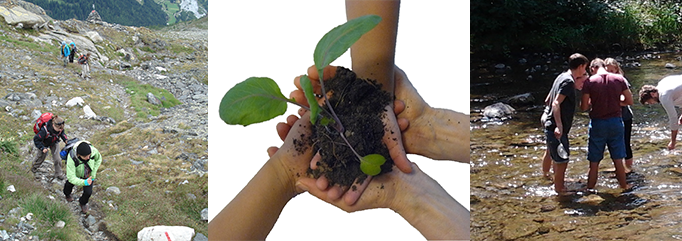Major: Environmental and Sustainability Sciences

The Major Environmental and Sustainability Sciences (ESS) concentrates on the interactions and interdependencies between human activities and the environment. It has a strong focus on sustainability, understood as a question of balancing environmental, social, and economic objectives.
The following chart gives you an overview of the modules in the ESS Major:

The chart provides an overview of the ESS Major, but the modules are not necessarily listed in the order in which they will be taken. A full description of each module is available in the Module Handbook. The basic and profile courses we offer in the above-mentioned modules are listed in the Course Catalog.
Full description
Students choose their Major after completing the Foundational Year. In the Major Environmental and Sustainability Sciences (ESS), students explore human beings and their interactions with the environment for more sustainability. ESS students engage in scientific work related to contemporary environmental issues (e.g. climate change, biodiversity loss, food production, energy supply), while being introduced to research methods of the Environmental and Sustainability Sciences. The starting point is foundational knowledge acquisition in the Environmental and Sustainability Sciences in the basic modules. Later on, students expand and apply this knowledge in the profiling modules and Electives. The profiling modules provide students with specialization opportunities e.g. in questions of sustainable resources use, energy supply, and/or environmental governance.
The ESS Major takes a holistic approach and includes a variety of interrelated disciplines with a strong focus on the goals of a sustainable development. In this context, sustainability is defined in terms of how to balance environmental, social, and economic objectives. Within the LAS program, this encompassing approach also provides the opportunity to participate in joint interdisciplinary courses and projects together with students from the other Majors. The ESS curriculum thus includes courses that familiarize students with qualitative and quantitative methods and enable them to conduct a first research project in the sciences.
LAS graduates with a Major in Environmental and Sustainability Sciences are awarded the degree Bachelor of Science. The degree qualifies them for a wide range of Master's programs in various natural and social sciences fields. Depending on their academic interests and the subject-specific requirements of the programs they are interested in, students are encouraged and guided to choose courses in the ESS profile modules and in the LAS Electives area that fit their academic and career aspirations. Students are ultimately responsible for the choices they make, but are supported and advised by their academic advisor and by the coordinator of the ESS Major.
An overview of what ESS (formerly EES) graduates do after their Bachelor from UCF, can be found here.
For more information about this Major, please contact Dr. Sabine Sané.
Please note: Until the 2020 StuPO reform, this Major was titled "Earth and Environmental Sciences (EES)". The new name "Environmental and Sustainability Science (ESS)" reflects the gradual content shift towards Sustainability Sciences, provides more opportunities for connections to other Majors, and benefits from the interdisciplinary sustainability research focus at the University of Freiburg.
For a student perspective on the ESS Major, please see the student-run ESS website that covers experiences, courses and lecturers as well as internship and graduate program opportunities.



